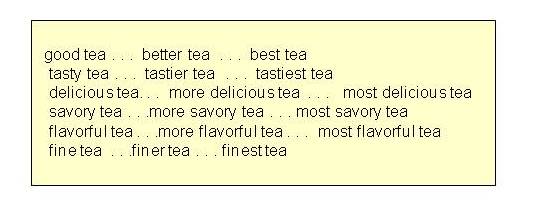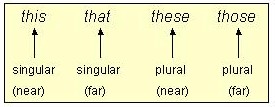DETERMINERS
Determiners signal (“determine”) that a noun will follow. Unlike adjectives, which also signal that a noun will follow, determiners cannot add the inflectional morphemes -er and -est. In addition, because they are function words, determiners do not have other forms or synonyms. Their "meaning" is their function: to signal that a noun will follow.
The following examples illustrate the difference:
Determiner + noun tea


Adjective + noun tea


Note that each adjective has a distinct meaning.
In addition, each adjective may add its comparative (-er) and superlative (-est) form

Types of determiners
1. articles (the hat, a hat, an opera)
2. possessive nouns / pronouns (Mary’s hat, her hat) (more about possessive nouns)
2. possessive nouns / pronouns (Mary’s hat, her hat) (more about possessive nouns)
3. numbers (five hats, eight hats, twenty hats)
4. indefinite pronouns (each hat ,some hats, both hats) (more about indefinite pronouns)


Singular:
one
|
someone
|
anyone
|
no one
|
everyone
|
each
|
somebody
|
anybody
|
nobody
|
everybody
|
(n)either
|
something
|
anything
|
nothing
|
everything
|
Examples:
|
Somebody is coming to dinner.
|
Neither of us believes a word Harry says.
|
Plural:
Examples:
|
Both are expected at the airport at the same time.
|
Several have suggested canceling the meeting.
|
Singular with non-countables / Plural with countables:
Examples:
|
Some of the dirt has become a permanent part of the rug.
|
Some of the trees have been weakened by the storm.
|
Indefinite pronouns use apostrophes to indicate possessive case.
Examples:
|
The accident is nobody’s fault.
|
How will the roadwork affect one's daily commute?
|
Some indefinite pronouns may also be used as determiners.
one, each, either, neither, some, any, one, all, both, few, several, many, most
Note the differences:
|
Each person has a chance.
|
(Each is a determiner describing person.)
|
Each has a chance.
|
(Each is an indefinite pronoun replacing a noun.)
|
Both lawyers pled their cases well.
|
(Both is a determiner describing lawyers.)
|
Both were in the room.
|
(Both is an indefinite pronoun replacing a noun.)
|
5. demonstrative pronouns (that hat, those hats) (more about demonstrative pronouns)


Demonstrative pronouns can also be used as determiners.
|
Example:
|
Hand me that hammer. (that describes the noun hammer)
|
Demonstrative pronouns can also be used as qualifiers:
|
Example:
|
She wanted that much money? (that describes the adjective much)
|
Native speakers of English learn when to use articles with nouns as they learn to speak.
However, learning when to use articles is often difficult for non-native speakers.
The difference between article use with town and city illustrates the difficulty:
Correct: I walked to the town. (article the before town)
Correct: I walked to town. (no article before town)
Correct: I walked to the city. (article the before city)
Incorrect: I walked to city. (no article before city)
No comments:
Post a Comment